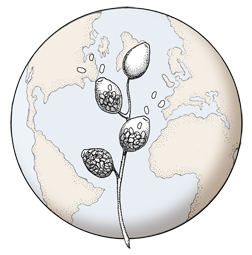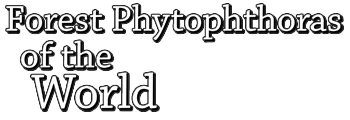Publication Type:
Journal ArticleSource:
Journal of Applied Biosciences, FACT Limited, Volume 21, p.1246–1257 (2009)URL:
http://www.m.elewa.org/JABS/2009/21/Abstract4-Yao.htmlAbstract:
An experiment was conducted to study epidemiological variation of Phytophthora katsurae on coconut trees from four farming areas. Isolates of the pathogenic agent were first characterized based on morphology of sporocysts, oospore, chlamydospore and mycelium, and this enabled detection of differences between the aggressiveness of strains. Differences were also detected when measuring the mycelium growth of each strain in vitro on different culture media (V8, Malt and Carotte). A second study was conducted to confirm the observed differences based on inoculation (gentle or rough) of coconut plants cv. Equatoriale Guinea Green Dwarf (NVE), which is susceptible to P. katsurae, with each of four strains. Last, the enzymatic dosages of pectate lyase and laccase in pathogen were analysed. These enzymes degrade the pectin and lignin of the plant cell walls. Gentle inoculation enabled assessment of the level of aggressiveness of each strain. The activity of pectate lyase and laccase varied between the strains and the synthesis of these enzymes was correlated to pathogen aggressiveness on the plant. The results showed that the strains of Marc Delorme and Assinie are less aggressive than the strain of Fresco, which is less aggressive than the strain of Robert Michaux. The zoospores and the mycelia are considered as the primary inoculum of the four strains. The β-sitosterol added to V8 medium had no influence on the mycelium growth of the four strains. However, its use as ingredient added to the media favoured an increased production of sporocysts. The discovery of this intra specific variability should be of considerable help in elaborating control methods against P. katsurae of coconut trees.


